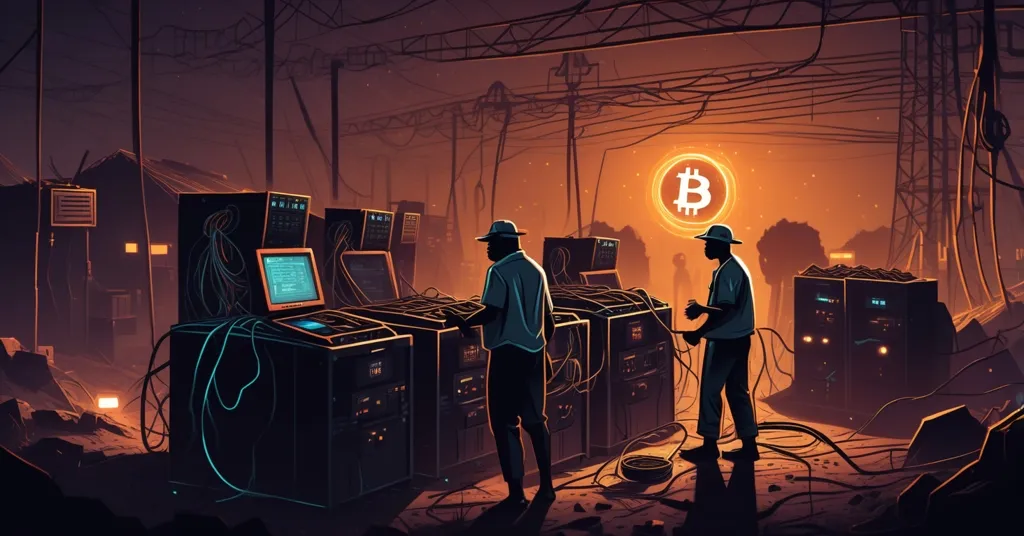Interpol Seizes $100M in African Crypto Bust: Bitcoin Mining and Fraud Exposed

Interpol’s $100M Crypto Crime Bust in Africa: Bitcoin’s Promise Meets Harsh Realities
Interpol, alongside African authorities, has delivered a staggering blow to cryptocurrency crime, seizing $100 million in assets and arresting over 1,200 individuals across multiple nations. This operation, centered heavily in Angola, exposes the gritty underbelly of crypto—illegal mining and rampant fraud—while reigniting the global debate over energy use and regulation in the blockchain space.
- Major Crackdown: Over 1,200 arrests and $100 million seized across African countries.
- Angola’s Stand: 25 illegal Bitcoin mining operations shut down, equipment worth $37 million confiscated.
- Global Tension: Energy theft and scams fuel calls for tighter crypto controls.
Angola’s Mining Crackdown: Power Over Profit
In Angola, a nation of 39 million people wrestling with chronic power shortages, the government has drawn a hard line against crypto mining. In April 2024, it banned the practice outright, imposing penalties of 1-5 years imprisonment for anyone caught with mining gear. The reasoning is straightforward: Bitcoin mining, which relies on a system called proof-of-work (PoW) to keep the network secure, demands massive amounts of electricity. Miners use powerful computers to solve complex puzzles, earning new Bitcoin while validating transactions. But when illegal operations in Angola siphon power meant for homes and hospitals, it’s a crisis waiting to happen. During this Interpol-led sting, 25 illicit mining setups run by 60 Chinese nationals were dismantled, with hardware valued at $37 million seized. In a rare move, Angola plans to redistribute these assets to support vulnerable communities, turning a story of exploitation into a flicker of hope.
The energy struggle in Angola isn’t just numbers on a page. Imagine entire neighborhoods plunged into darkness so a handful of miners can chase Bitcoin profits. It’s no wonder the government acted decisively, though the ban raises questions about stifling financial innovation in a country desperate for economic tools. As a Bitcoin advocate, I see the necessity of PoW for unmatched security—no central authority can tamper with it—but even I can’t ignore the energy consumption challenges tied to Bitcoin mining.
Crypto Scams Beyond Mining: Zambia’s $300M Tragedy
While mining grabs headlines, fraud is crypto’s silent cancer. In Zambia, a jaw-dropping $300 million investment scam duped 65,000 individuals with promises of sky-high returns. That’s roughly 1% of the nation’s annual GDP, a gut punch to a developing economy. These predators aren’t innovators; they’re old-school con artists hiding behind blockchain buzzwords. They exploit financial desperation and limited awareness, leaving victims broke and disillusioned. According to reports from local authorities, the scale of this fraud highlights how crypto’s promise of wealth can be weaponized against the very people it aims to empower.
Let’s not sugarcoat it: this isn’t just a Zambian issue. Scams erode trust in a technology meant to liberate us from broken systems. They give ammo to regulators itching to clamp down, and they make Bitcoin’s mission of financial freedom look like a cruel joke. Countering this means the crypto community must root out these parasites with as much zeal as we push for decentralization, especially given the broader impact of crypto fraud across Africa.
Global Mining Woes: Energy Theft from Russia to Texas
Angola’s crackdown isn’t an isolated incident; it’s part of a worldwide reckoning. In Russia’s Republic of Buryatia, authorities recently uncovered 95 mining rigs stashed in a truck, illegally tapping a 10-kilovolt power line meant for a village. This marks the sixth such case of electricity theft tied to mining in the region this year alone, per Rosseti Siberia’s Buryatenergo unit. Miners often chase Bitcoin’s rewards—especially when prices spike, with BTC hovering near historic highs—by cutting corners, ethics be damned. The allure is simple: mining profitability skyrockets with cheap or stolen power, but the cost falls on everyone else.
In the US, the story splits. New York slapped a two-year moratorium on PoW mining in 2022, citing environmental and energy concerns, while Texas rolls out the red carpet for giants like MARA Holdings, Riot Platforms, and CleanSpark with cheap energy and lax rules. It’s a stark contrast, showing no global consensus on handling mining—just a messy battle between progress and public welfare. Why do miners risk such brazen acts? Beyond profit, lax enforcement in some regions and access to undervalued electricity create a perfect storm for crime. In 2023, energy theft tied to mining likely cost utilities millions worldwide, based on reported cases. It’s a gamble, and too often, communities lose.
The Energy Debate: Bitcoin’s PoW vs. Ethereum’s PoS
For those new to the space, let’s unpack why mining is such a lightning rod. Bitcoin’s PoW system keeps the blockchain secure and running by having miners compete to solve puzzles, earning coins as a reward. It’s the gold standard for decentralization—no single player can dominate, and the network has resisted censorship for over a decade. The catch? It’s an energy hog. Mining one Bitcoin can use enough power to run a small car across the country. Compare that to Ethereum, which switched to proof-of-stake (PoS) in 2022, cutting its energy use by over 99%. In PoS, people lock up their crypto to help protect the network, no heavy computing needed. Critics argue PoS sacrifices some decentralization for sustainability, while Bitcoin’s security comes at a literal and environmental cost.
As someone leaning toward Bitcoin maximalism, I’ll defend PoW’s battle-tested resilience. Nothing matches its track record. Yet, I can’t dismiss Ethereum’s model as a viable niche. Altcoins often fill gaps Bitcoin doesn’t aim to—smart contracts, faster transactions—but they don’t replace BTC’s ideological purity as a store of value. The energy debate isn’t black-and-white; it’s a spectrum of trade-offs we must navigate.
Renewable Energy: Can Bitcoin Mining Go Green?
Here’s where optimism kicks in, tempered by realism. Some mining operations, especially in Texas, are experimenting with renewable energy like solar and wind to power rigs. Riot Platforms, for instance, has invested in solar initiatives to offset its footprint. Globally, places like Iceland leverage geothermal energy for mining, showing what’s possible. From an effective accelerationism (e/acc) standpoint—pushing tech progress aggressively to solve problems faster, even at risk—this is the path forward. If we scale renewables, mining could drive green innovation rather than drain grids.
But let’s not get carried away. Renewables can’t yet match the 24/7 demand of mining rigs, often requiring fossil fuel backups. Weather dependency and high upfront costs are hurdles, and not every region has Iceland’s natural advantages. The potential is there, but it’s a slog. Bitcoin’s future as uncensorable, borderless money depends on cracking this nut without compromising its ethos.
Africa’s Crypto Divide: Angola’s Ban vs. Nigeria’s Embrace
Angola’s hardline stance isn’t Africa’s only story. Nigeria, despite its own battles with fraud, has embraced crypto for remittances, with millions using Bitcoin to bypass costly traditional systems. It’s a lifeline in a region where banking fails the masses. This contrast shows the tightrope: Angola prioritizes energy security, justifiably targeting illegal ops with measures detailed in recent crackdown reports, but risks choking innovation. Nigeria accepts the bad with the good, betting on crypto’s upside. Both approaches have merit, yet both face the same scourge—scammers and resource hogs tainting the space. Africa’s crypto landscape is a microcosm of the global push-and-pull, where freedom and chaos collide, as discussed in broader community insights on African crypto crime.
Balancing Freedom and Chaos: A Wake-Up Call
Playing devil’s advocate, governments like Angola aren’t wrong to protect citizens over miners’ profits. When 65,000 Zambians lose $300 million to fraud, it’s fuel for the “crypto is crime” narrative. Harsh regulation feels like a natural response. Yet, blanket bans and overreach threaten Bitcoin’s core mission—giving power back to individuals, not stealing it via electricity or scams. Angola’s mining ban, further explored in government energy crisis reports, doesn’t outlaw owning or trading crypto (yet), but it’s a slippery slope. Overregulation could snuff out a tool that liberates millions from corrupt financial systems, especially in developing nations.
Historically, this fight isn’t new. China’s 2021 mining ban pushed operations underground or overseas, solving little while disrupting much. The answer isn’t prohibition; it’s targeted action against bad actors paired with tech solutions. Bitcoin’s promise of freedom hinges on us cleaning up these messes—otherwise, it’s just a shiny toy for crooks and energy thieves. The Interpol operation is a glaring reminder for the crypto community to get its house in order, championing decentralization with eyes wide open to the flaws.
Key Takeaways and Questions
- Why did Angola ban Bitcoin mining?
Angola banned it in April 2024 due to severe power shortages, blaming miners for draining resources needed for its 39 million citizens. - What’s the scale of crypto fraud in Africa?
In Zambia, a $300 million scam defrauded 65,000 people, showing how fraud exploits desperation and harms crypto’s reputation. - How does Bitcoin mining cause energy theft?
Miners, chasing profits, often steal power, as seen in Russia’s Buryatia with rigs tapping village lines, costing utilities millions globally. - Is Bitcoin’s energy use the only issue?
Yes and no—Bitcoin’s PoW is energy-intensive, but altcoins like Ethereum with PoS offer sustainable models, though with different trade-offs. - Can crypto mining become sustainable?
Potentially, with renewable energy experiments in Texas and Iceland, though scalability and cost remain significant barriers. - Are mining bans a threat to decentralization?
They can be, risking Bitcoin’s ethos of financial freedom, though targeted action against illegal mining is often warranted. - How does Africa’s crypto divide impact adoption?
Angola’s ban contrasts Nigeria’s embrace for remittances, showing varied approaches to balancing innovation with crime and resource risks. - What’s the path forward for Bitcoin?
Solving energy woes via renewables and purging bad actors is key to preserving Bitcoin as a tool for freedom, not chaos.



